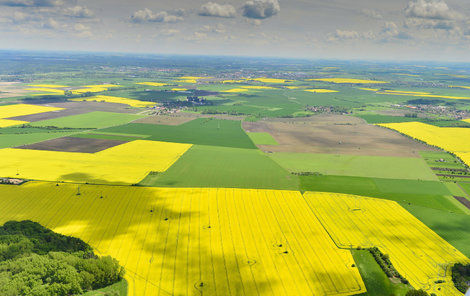Research by German entomologists during the past past 27 years shows that the incidence of flying insects, according to the findings of research, has fallen by 75 percent.
"Two-thirds of all life on earth are insects. If we lose him so fast, it's scary. As soon as we lose insects, the whole ecological system breaks down, "said Dave Goulson, a professor at the University of Sussex.
The death of the last male northern rhinoceros filled the world's media, sparked a passionate debate, spread on social networks. If the last horn-beetle gives goodbye, we may not even know about it. And we will not even want to know. Indeed, the insect is mostly annoying for us.
The public has no motivation to worry about it.
Indicators of contamination of nature are also bees. In the past year, controllers collected samples of honey at 200 locations in the globe to analyze them. The findings, published in the journal Science, were once again very worrying and alarming. Three-quarters of the samples contained traces of chemicals. The worst hit was North America (86%), followed by Asia (80%) and Europe (76%). South America (57%) is the cleanest. Almost half of all samples allegedly contained a cocktail of pesticides that are used to protect the crop.
In Europe, 84% of plant species and 76% of food production depend on bee pollination. EU statistics say that the economic value it creates is equivalent to € 14.2 billion a year.
"It's like building a new ecosystem. Ourselves. Only the most resilient organisms can profit from our new resources. Which are usually pests. The more we do it ourselves, the more we harm ourselves, "says Czech biologist Martin Sorg, who participated in the German research.
In his view, there are no areas where both insects and game could find shelter. Natural spaces have long vanished under the lines of endless fields.
"Even the hare is already at risk in our country. The birds are bad too. Such an oyster has nothing to eat, because it will not hit the big grasshopper. Becausethe big grasshopper does not have where to be" explains Czech entomologist Petr Šípek.
Scientists consider intensive agriculture to be a major cause of the extinction of species by changing the landscape and massive use of pesticides.
Full length source (Czech language only):
https://hobby.idnes.cz/hmyz-vymira-...hrada.aspx?c=A180510_105330_hobby-zahrada_mce

"Two-thirds of all life on earth are insects. If we lose him so fast, it's scary. As soon as we lose insects, the whole ecological system breaks down, "said Dave Goulson, a professor at the University of Sussex.
The death of the last male northern rhinoceros filled the world's media, sparked a passionate debate, spread on social networks. If the last horn-beetle gives goodbye, we may not even know about it. And we will not even want to know. Indeed, the insect is mostly annoying for us.
The public has no motivation to worry about it.
Indicators of contamination of nature are also bees. In the past year, controllers collected samples of honey at 200 locations in the globe to analyze them. The findings, published in the journal Science, were once again very worrying and alarming. Three-quarters of the samples contained traces of chemicals. The worst hit was North America (86%), followed by Asia (80%) and Europe (76%). South America (57%) is the cleanest. Almost half of all samples allegedly contained a cocktail of pesticides that are used to protect the crop.
In Europe, 84% of plant species and 76% of food production depend on bee pollination. EU statistics say that the economic value it creates is equivalent to € 14.2 billion a year.
"It's like building a new ecosystem. Ourselves. Only the most resilient organisms can profit from our new resources. Which are usually pests. The more we do it ourselves, the more we harm ourselves, "says Czech biologist Martin Sorg, who participated in the German research.
In his view, there are no areas where both insects and game could find shelter. Natural spaces have long vanished under the lines of endless fields.
"Even the hare is already at risk in our country. The birds are bad too. Such an oyster has nothing to eat, because it will not hit the big grasshopper. Becausethe big grasshopper does not have where to be" explains Czech entomologist Petr Šípek.
Scientists consider intensive agriculture to be a major cause of the extinction of species by changing the landscape and massive use of pesticides.
Full length source (Czech language only):
https://hobby.idnes.cz/hmyz-vymira-...hrada.aspx?c=A180510_105330_hobby-zahrada_mce

Last edited:
